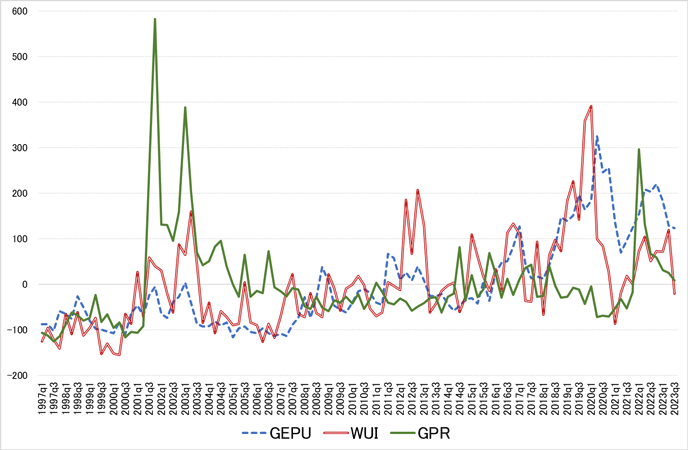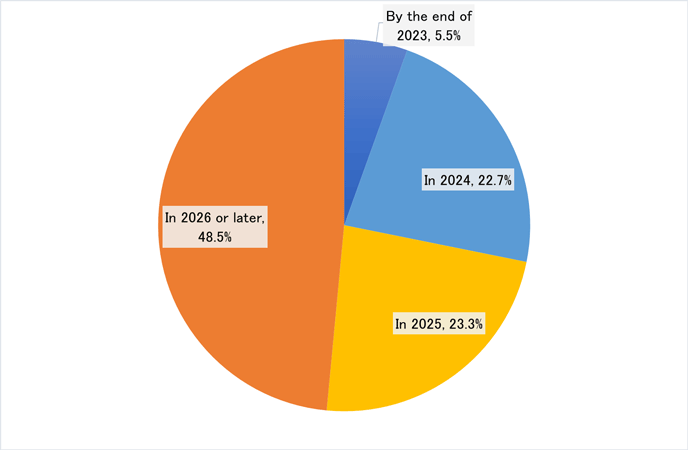Growing Uncertainties Worldwide
Over the past two decades, the global economy has been confronted with unforeseen uncertainty shocks, including the global financial crisis, the European debt crisis, and the COVID-19 crisis. Naturally, those shocks have had huge impacts on the Japanese economy. In recent years, we have witnessed military conflicts and the worsening of the security environment, including the war in Ukraine, the conflict in the Gaza Strip in the Middle East, and the progress made in North Korea’s missile development, and the international situation is therefore expected to remain unstable in 2024. Furthermore, the possibility cannot be ruled out that a new emergency that is unforeseen at the moment may arise.
The growing uncertainty has a negative impact on various economic activities, including investment and consumption (Note 1). That is because companies and households tend to take a wait-and-see behavior until uncertainty has been resolved. In the field of trade policy alone, in recent years, there has been a succession of uncertainty shocks, including the United Kingdom’s referendum on Brexit, the United States’ withdrawal from the TPP negotiations, and the tit-for-tat tariff measures imposed by the United States and China against each other. While raising tariff rates has the direct effect of reducing trade volume, the uncertainty over the future course of trade policy has an additional negative impact. In particular, with respect to the impact of Brexit, many empirical studies have shown that Brexit has had negative effects on trade, including services trade, and the UK economy overall (Note 2). It is considered to be a solid empirical fact that trade policy uncertainty has the effect of curbing trade (Handley and Limão, 2022).
Global Uncertainty Indexes
Under these circumstances, various indexes intended to quantitatively capture global uncertainty have been developed. Representative examples are 1) the Global Economic Policy Uncertainty Index (GEPU; Davis, 2016), 2) the World Uncertainty Index (WUI; Ahir et al., 2022), and 3) the Geopolitical Risk Index (GPR; Caldara and Iacoviello, 2022), all of which have been developed using the text mining method (Note 3).
The GEPU is a monthly index composed on the basis of articles carried by major newspapers in various countries. More specifically, it represents a GDP-weighted average of national EPUs for 16 major countries (Note 4). The WUI is a quarterly index using Country Reports (143 countries) compiled by the Economist Intelligence Unit. The GPR is a monthly index that is compiled in order to measure the risk levels of negative geopolitical events based on newspaper articles. Many studies have already used those indexes to analyze the impact of uncertainty on trade and economic activities.
When we look at the trends in the global uncertainty indexes (see Figure 1), the GEPU and the WUI were at a very high level early in the COVID-19 crisis and they also rose in 2012, when the European debt crisis occurred, and in 2016, when the referendum on Brexit was held, and when the Trump administration was inaugurated in the United States (Note 5). Those two indexes also rose to a very high level in the first quarter of 2022, when the Russian invasion of Ukraine started. Meanwhile, the GPR showed quite different movements: it recorded its highest and second highest levels at the time of the multiple terrorist attacks in the United States (the fourth quarter of 2001) and the multinational forces’ attacks on Iraq (the first quarter of 2003), respectively, and it rose to the third-highest level when the Russian invasion of Ukraine started (the first quarter of 2003) (Note 6). However, the GPR did not show any significant change during the COVID-19 crisis, as is natural given the nature of the risks that this index is intended to capture.
Figure 1 covers the period until the third quarter of 2023—the most recent period for which the data was available when this article was written—which means that the impacts of the Hamas’ attack on Israel and the Israeli military reaction (the fourth quarter of 2023) are not reflected in the figure. However, depending on the future course of the situations in Ukraine and in the Middle East, uncertainty could grow dramatically on both political and economic fronts.

Geopolitical Tail Risk
Nearly two years have passed since the start of the Russian invasion of Ukraine. The invasion has already had an extensive economic impact, and given the difficulty of predicting how the Ukraine situation will play out, there is a high level of uncertainty over the future course of the conflict and when it may end. According to a survey I conducted with around 13,000 Japanese people in September 2023, around half of the respondents expected that the conflict will end in 2026 or later, but the distribution of answers regarding the timing of the end of the conflict is wide, which indicates a high level of uncertainty over the future outlook (see Figure 2).
The possibility cannot be ruled out that an unforeseen emergency may arise as the military conflicts drag on. According to the tally of responses to a question asking respondents for their subjective probability of a nuclear weapon being used in the Ukraine war, a kind of tail risk—a tail risk refers to an event whose occurrence probability is low but which, if it actually occurs, will have a huge impact—the median probability was 10% and the mean probability was 22% (Note 7). Only 19% of all respondents replied that the probability was zero. If a nuclear weapon is used, there is no doubt that it will deliver an extremely serious shock to the global political and economic order, with economic activity seriously disrupted. Many people assume that the possibility of such a scenario occurring is not zero.

As mentioned earlier, global uncertainty shocks significantly affect international trade and economic activity in Japan and other countries. I hope that unforeseen shocks will not arise in 2024. Large-scale natural disasters are unpreventable, and the presence of geopolitical risks is inevitable, and to mitigate those risks, it is essential to take actions that go beyond the confines of economic policy. However, at the least, it is necessary to make efforts to minimize uncertainty factors that have the potential to be controlled by governments and through international cooperation.


